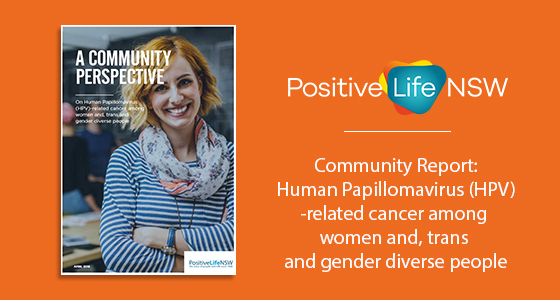
HIV-positive and HIV-negative, immunocompromised women and, trans and gender diverse people are at increased risk of human papillomavirus (HPV)-related cancers of the cervix, vagina, vulva, anus, mouth and throat.
In 2018, Positive Life and Femfatales (the Australian National Network of Women Living with HIV), developed an anonymous online survey targeting: 1) women and, trans and gender diverse PLHIV, and 2) other HIV-negative women and, trans and gender diverse people across Australia to assess whether these populations were equipped with enough information and strategies to prevent HPV-related cancer, detect HPV-related cancer early, and stay cancer free post-treatment and/or recovery. We also sought to understand and assess the experiences of respondents when accessing services to prevent, treat, and recover from HPV-related cancers, and to identify any potential health care access barriers.
While significant progress has been made in the early detection of cervical cancer, less progress has been made in the area of anogenital HPV-related cancer, particularly anal cancer. Findings from this survey identify important knowledge deficits in HPV-related cancer risk awareness, symptom recognition, screening and HPV vaccination among these at-risk population groups. With this information, we have the ability to construct targeted education initiates that address knowledge deficits and help to reduce morbidity and mortality from late diagnosis of HPV related cancers: particularly anal cancer.
While high percentages of respondents from all risk groups had regular screening for cervical cancer, the opposite was true for anal cancer screening. Very high proportions from all risk groups had never been screened for anal cancer (for example, 92% of HIV-positive respondents and 89% of HIV-negative and immunocompromised respondents had never had an anal cancer examination). Those who reported having been screened for anal cancer, reported having either a DARE or HRA.
The results of this survey have identified 7 key areas that warrant action:
- Raising awareness of HPV-related cancer risk and symptoms (cervical, vaginal, vulvar, and anal) among women and, trans and gender diverse people living with HIV, and immunocompromised women and, trans and gender diverse people;
- Increasing screening for anogenital HPV-related cancers and particularly anal cancer among women and, trans and gender diverse people living with HIV, and immunocompromised women and, trans and gender diverse people;
- Increasing vaccination rates among HIV-positive and immunocompromised women and, trans and gender diverse people;
- Increasing awareness of the new National Cervical Screening Guidelines;
- Increasing clinician awareness of the need for entire lower anogenital tract examinations among women and, trans and gender diverse people living with HIV, and immunocompromised women and, trans and gender diverse people;
- Increasing clinician-initiated discussion of HPV-related cancers; among women and, trans and gender diverse people living with HIV, and immunocompromised women and, trans and gender diverse people; and
- Increasing awareness of HPV-related cancers in the general public and sexual health for women (cis and trans), trans men and gender diverse people.
Community Report:![]() Human Papillomavirus (HPV)-related cancer among women and, trans and gender diverse people
Human Papillomavirus (HPV)-related cancer among women and, trans and gender diverse people






